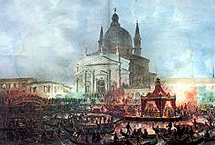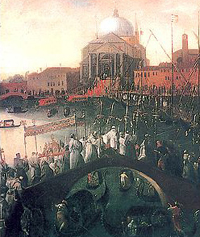
On July 13, 1577, the plague was declared definitively over and it
was decided that the city’s liberation from the terrible disease
should be celebrated on the third Sunday in July. A more populist
aspect soon accompanied the religious aspect of the festivity, representing
liberating times after such sadness.
 In
order to cross the Giudecca Canal and allow the procession to cross
over into the church, a mighty bridge of boats was built in the
festivity’s very first year and it is this element that still
characterises the celebrations today. In
order to cross the Giudecca Canal and allow the procession to cross
over into the church, a mighty bridge of boats was built in the
festivity’s very first year and it is this element that still
characterises the celebrations today.
Voices could be heard from the bridge or the votive church of people
either walking or travelling in festively decorated boats. This
conferred the festivity with a more profane aspect, in which devotion
intermingled with fun and entertainment.
It was a night of wakefulness, the “famous” night,
which ended with the arrival of dawn.
|